Resources
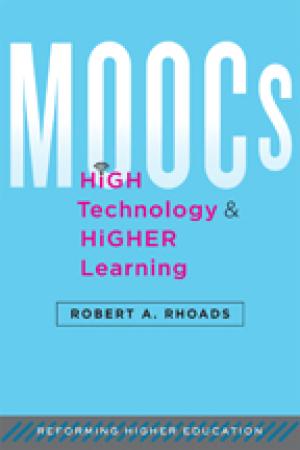
Click Here for Book Review Abstract: In MOOCs, High Technology, and Higher Learning, Robert A. Rhoads places the OpenCourseWare (OCW) movement into the larger context of a revolution in educational technology. In doing so, he seeks to bring greater balance to increasingly polarized discussions of massively open online courses (MOOCs) and show their ongoing relevance to reforming higher education and higher learning. Rhoads offers a provocative analysis of a particular moment in history when cultural, political, and economic forces came together with evolving teaching and learning technologies to bring about the MOOC. He argues persuasively that the OCW and MOOC movements have had a significant impact on the digitalization of knowledge and that they have helped expand the ways students and teachers interact and develop ideas collaboratively. He also critically analyzes the extensive media coverage of MOOCs while examining empirical studies of MOOC content delivery, the organizational system supporting the OCW/MOOC movement, and faculty labor concerns. Too often, technology advocates champion the MOOC movement as a solution to higher education’s challenges without recognizing the pedagogical, social, and economic costs. MOOCs, High Technology, and Higher Learning challenges many of the democratic claims made by MOOC advocates, pointing to vast inequities in the ways MOOCs are presented as an alternative to brick-and-mortar access for low-income populations. This book offers a clear-eyed perspective on the potential and peril of this new form of education. (From the Publisher)
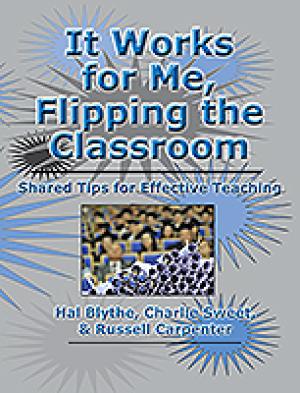
Click Here for Book Review Abstract: Our primary goal in assembling this collection is to convince faculty to experiment with the “flipped” classroom. Given the techtonic shift, providing educators with an abundance of electronic resources, as well as the nature of today’s students, every faculty member needs to consider the possibilities of the flip. Now that active learning has been demonstrated by research to be more effective than the pure sage-on-the-stage paradigm, flipping is a natural outgrowth with its recognition that classroom time needs to be dedicated to activities by the instructor, the individual students, and groups that promote a deeper learning of the material. This book offers a guide for those faculty members wishing to make the first steps, taking the instructor from preparation for the flipped class experience through actual out-of-class assignments, in-class activities, electronic resources available for support, and even assessment of student performance and class effectiveness. (From the Publisher)
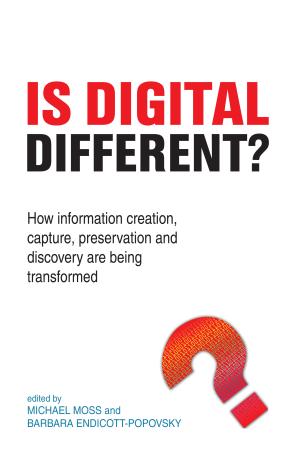
This edited collection brings together global experts to explore the role of information professionals in the transition from an analogue to a digital environment. The contributors, including David Nicholas, Valerie Johnson, Tim Gollins and Scott David, focus on the opportunities and challenges afforded by this new environment that is transforming the information landscape in ways that were scarcely imaginable a decade ago and is challenging the very existence of the traditional library and archive as more and more resources become available on line and as computers and supporting networks become more and more powerful. By drawing on examples of the impact of other new and emerging technologies on the information sciences in the past, the book emphasises that information systems have always been shaped by available technologies that have transformed the creation, capture, preservation and discovery of content.  Key topics covered include: • Search in the digital environment • RDF and the semantic web • Crowd sourcing and engagement between institutions and individuals • Development of information management systems • Security: managing online risk • Long term curation and preservation • Rights and the Commons • Finding archived records in the digital age. Is Digital Different? illustrates the ways in which the digital environment has the potential to transform scholarship and break down barriers between the academy and the wider community, and draws out both the inherent challenges and the opportunities for information professionals globally. (From the Publisher)
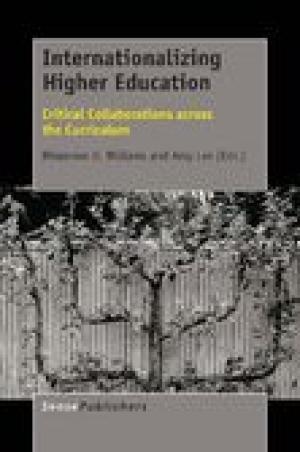
Click Here for Book Review Abstract: Higher education is facing unprecedented change as today’s graduates need particular skills, awareness, and knowledge to successfully navigate a complex and interconnected world. Higher education institutions and practitioners are under pressure to be attentive to internationalization initiatives that support increasingly diverse student populations and foster the development of global citizenship competencies which include, “problem-defining and solving perspectives that cross disciplinary and cultural boundaries” (Hudzik, 2004, p. 1 as cited in Leask & Bridge, 2013). Internationalizing Higher Education: Critical Collaborations across the Curriculum is for current and future faculty, student affairs staff, and administrators from diverse disciplinary, institutional, and geographic contexts. This edited volume invites readers to investigate, better understand, and inform intercultural pedagogy that supports the development of mindful global citizenship. This edited volume features reflective practitioners exploring the dynamic and evolving nature of intercultural learning as well as the tensions and complexities. Contributors include institutional researchers, directors and key implementers of EU/Bologna process in Poland (one of the newest members and one that is facing unprecedented change in the diversity of its students), international partners in learning abroad programs, and scholars and instructors across a range of humanities, STEM, and social sciences. (From the Publisher)
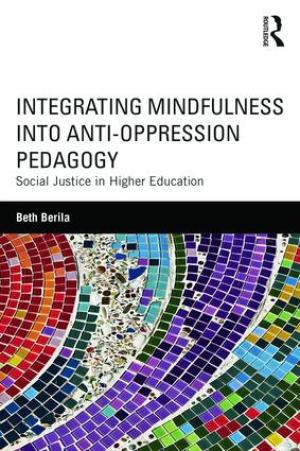
Click Here for Book Review Abstract: Drawing from mindfulness education and social justice teaching, this bookexplores an anti-oppressive pedagogy for university and college classrooms. Authentic classroom discussions about oppression and diversity can be difficult; a mindful approach allows students to explore their experiences with compassion and to engage in critical inquiry to confront their deeply held beliefs and value systems. This engaging book is full of practical tips for deepening learning, addressing challenging situations, and providing mindfulness practices in anti-oppression classrooms. Integrating Mindfulness into Anti-Oppression Pedagogy is for all higher education professionals interested in pedagogy that empowers and engages students in the complex unlearning of oppression. (From the Publisher)
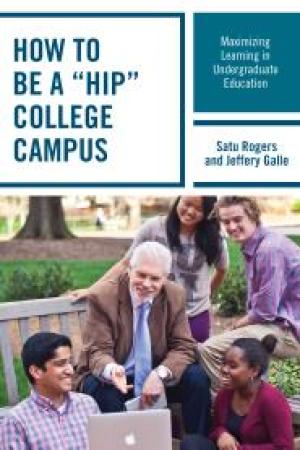
Click Here for Book Review Abstract: High Impact Practices (HIP). Through the voices of dozens of seasoned college faculty and junior and senior students, this book shares insights and practical examples on how a college campus can be “HIP”—utilizing high-impact educational practices widely and effectively. The book’s strength is numerous hands-on examples about HIPs’ implementation in and out of the classroom. HIPs have been proven to improve student learning, yet practical examples of their implementation are still few. This book fills that gap. Covering seven (sets of) HIPs, we ask such questions as: What do creative assignments based on active learning look like? How does one teach the “whole student?” How does and should student diversity affect teaching? The book is most beneficial to current and future instructors of college courses, especially those wanting to use more active learning pedagogies. It will also benefit university administrators and staff by identifying campus priorities, culture, and structure that support the effective implementation of HIPs. It makes the case for a campus-wide adoption of high-impact practices, across disciplines and in both academic and co-curricular life. (From the Publisher)
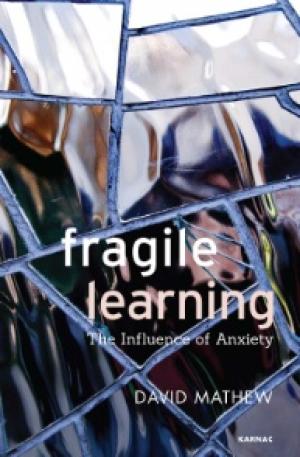
Click Here for Book Review Abstract: What are the barriers and obstacles to adults learning? What makes the process of adult learning so fragile? And what exactly do we mean by fragile learning? This book addresses these questions in two ways. In Part One, it looks at challenges to learning, examining issues such as language invention in a maximum security prison, geography and bad technology, and pedagogic fragility in Higher Education. Through a psychoanalytic lens, Fragile Learning examines authorial illness and the process of slow recovery as a tool for reflective learning, and explores ethical issues in problem-based learning. The second part of the book deals specifically with the problem of online anxiety. From cyberbullying to Internet boredom, the book asks what the implications for educational design in our contemporary world might be. It compares education programs that insist on the Internet and those that completely ban it, while exploring conflict, virtual weapons and the role of the online personal tutor. The book also examines the issue of time as a barrier to learning and its links to unconscious thinking, as well as defining fragility in a summative essay. Using real-life examples, originality and wit, Fragile Learning is an important contribution to the field of psychoanalysis and pedagogy. (From the Publisher)

Click Here for Book Review Abstract: In this new collection, contributors from a variety of disciplines provide a critical context for the relationship between feminist pedagogy and academic feminism by exploring the complex ways that critical perspectives can be brought into the classroom. This book discusses the processes employed to engage learners by challenging them to ask tough questions and craft complex answers, wrestle with timely problems and posit innovative solutions, and grapple with ethical dilemmas for which they seek just resolutions. Diverse experiences, interests, and perspectives—together with the various teaching and learning styles that participants bring to twenty-first-century universities—necessitate inventive and evolving pedagogical approaches, and these are explored from a critical perspective. The contributors collectively consider the implications of the theory/practice divide, which remains central within academic feminism’s role as both a site of social and gender justice and as a part of the academy, and map out some of the ways in which academic feminism is located within the academy today. (From the Publisher)
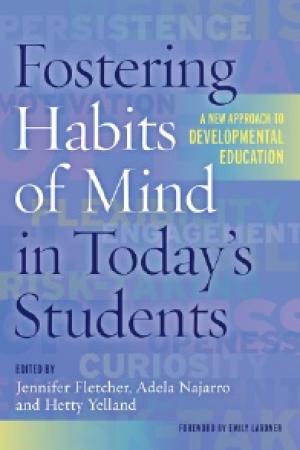
Students need more than just academic skills for success in college and career, and the lack of an explicit instructional focus on the “soft skills” critical to postsecondary success poses a challenge for many students who enter college, especially the underprepared. Based upon a multi-campus, cross-disciplinary collaboration, this book presents the resulting set of habits-of-mind-based strategies that demonstrably help not only low-income, ESL, and first-generation college students overcome obstacles on the path to degree completion; these strategies equally benefit all students. They promote life-long, integrative learning and foster intellectual qualities such as curiosity, openness, flexibility, engagement, and persistence that are the key to developing internalized and transferrable competencies that are seldom given direct attention in college classrooms. This contributed volume, written with full-time and adjunct faculty in mind, provides the rationale for this pedagogical approach and presents the sequential instructional cycle that begins by identifying students’ assets and progressively focusing on specific habits to develop their capacity to transfer their learning to new tasks and situations. Faculty from both two-year and four-year colleges provide examples of how they implement these practices in English, math, and General Education courses, and demonstrate the applicability of these practices across course types and disciplines. Chapters address key factors of college success, including: * The link between habits of mind and student retention and achievement * Using an assets-based approach to teaching and learning * Supporting and engaging students * Creating inclusive learning communities * Building confidence and self-efficacy * Promoting transfer of learning * Teacher networks and cross-disciplinary collaboration By foregrounding habits of mind as an instructional lens, this book makes a unique contribution to teaching in developmental and general education settings. (From the Publisher)
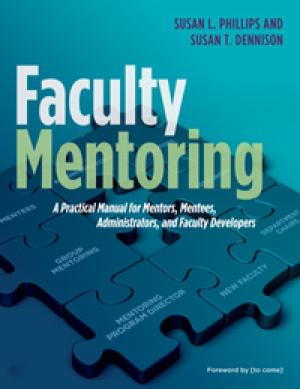
Click Here for Book Review Abstract: Faculty mentoring programs greatly benefit the institutions that have instituted them, and are effective in attracting and retaining good faculty. Prospective faculty members commonly ask about mentoring at on-campus interviews, and indicate that it is a consideration when choosing a position. Mentoring programs also increase the retention rate of junior faculty, greatly reducing recruitment costs, and particularly help integrate women, minority and international faculty members into the institution, while providing all new hires with an orientation to the culture, mission and identity of the college or university. The book provides step-by-step guidelines for setting up, planning, and facilitating mentoring programs for new faculty members, whether one-on-one, or using a successful group model developed and refined over twenty-five years by the authors. While it offers detailed guidance on instituting such programs at the departmental level, it also makes the case for establishing school or institutional level programs, and delineates the considerable benefits and economies of scale these can achieve. The authors provide guidance for mentors and mentees on developing group mentoring and individual mentor / protégé relationships – the corresponding chapters being available online for separate purchase; as well as detailed outlines and advice to department chairs, administrators and facilitators on how to establish and conduct institution-wide group mentoring programs, and apply or modify the material to meet their specific needs. For training and faculty development purposes, we also offer two chapters as individual e-booklets. Each respectively provides a succinct summary of the roles and expectations of the roles of Mentor and Mentee. Faculty Mentoring / Mentor Guide The booklets are affordably priced, and intended for individual purchase by mentors and mentees, and are only available through our Web site. (From the Publisher)
Wabash Center Staff Contact
Sarah Farmer, Ph.D
Associate Director
Wabash Center
farmers@wabash.edu